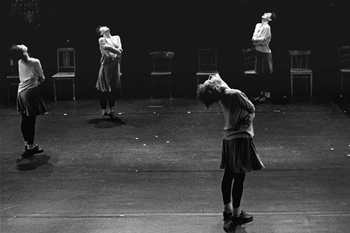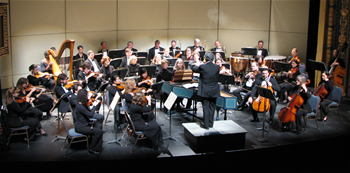A small but devoted audience was present at UNC Chapel Hill’s Hill Hall for the rare occasion of a concert entirely devoted to compositions by members of the faculty of the Department of Music – Allen Anderson, Stefan Litwin, Stephen Anderson and Lee Weisert. Anderson, in his early sixties, joined the faculty in 1996; his three colleagues are considerably his junior. Stephen Anderson, in his thirties, is both composer and active jazz pianist; Stefan Litwin, born 1960, is an accomplished concert pianist and composer; Lee Weisert (b. 1978), works with both instrumental and electronic music.
The evening opened with an exceptional performance by a freshman student performer from UNC Chapel Hill, violinist Kevin Zheng, who presented Casting Ecstatic, a composition for solo violin written in 1994 for Allen Anderson’s colleague at Brandeis, Daniel Stepner, the first violinist for the Lydian Quartet. This is a very difficult work with many dissonant dyads and exploration of a variety of sonorities, and one could scarcely imagine it being better played than it was by Zheng, a musician who will certainly, if he chooses, go on to a major career as soloist. Outstanding.
Stefan Litwin was joined for his Two Songs on Aphorisms by Karl Kraus (2012), a world premiere, by soprano Melissa Martin, a first-rate artist with a commanding stage presence. Her German sounded completely idiomatic, and her diction crystal-clear, with a perfect delivery of the humor of the rather old-fashioned (i.e. German expressionist) work. (I suppose it is not for nothing that Litwin chose to exaggerate his setting of the word “ausdrücken” – to express). A whole lieder recital by Martin would be something to look forward to.
Next up was a work by Stephen Anderson for piano and percussion, Correspondences (2001), with the composer at the piano joined by percussionist Juan Álamo. Simply from the visual standpoint, it might have been wise for someone to advise the duo prior to the performance that a setup which left the percussionist facing away from audience (positioned far to the right on the stage) and the pianist invisible behind his instrument sends an unfortunate message to the listeners. If you are Miles Davis, you can face whichever you wish on stage – but mere mortals should not choose to follow his example. Likewise, it hardly seems necessary to amplify a concert grand piano in the overly live acoustics of Hill, but one soon realized that the intent was to gain a better balance with the percussion. However, the writing for both instruments was such that any of the detail of the piano was lost behind the relentless assault on the battery.
After intermission there was an attractive soundscape for alto saxophone and electronics, Any thing that Is strang (2012), by Lee Weiser, a long, slow and atmospheric work embedding gestures by the live saxophonist, Matthew McClure, in a recorded background also based on the saxophone. Weisert demonstrated an individual voice, and a sharp ear for developing the particular sonorities of the sax as they connect with the idioms of electronic music. On a first listening the overall structure of the piece was hard to discern.
I was less taken by the extended new work for solo viola by Allen Anderson that followed, the autographia, played by Wendy Richman. The piece was in five movements, inspired by details of calligraphic signatures, but the language is so abstract that even a focused and educated listener might have a difficult time following its rhetoric for long. The word for a piece like this, alas, is “rebarbative”.
Concluding the evening was an extended setting of the words of the final broadcast by Salvador Allende, president of Chile prior to the US-inspired coup by Chile’s military that led to the seventeen-year dictatorship by Gen. Pinochet, later indicted and arrested (but not tried) for human rights abuses. It takes a certain amount of boldness to take on such emotionally charged material, but to my ears Litwin’s presentation struck the right balance. Litwin both played the piano, accompanied by clarinetist Christa van Alstine and cellist Ashley Bathgate, and declaimed the text, always in a sort of dry, emotionally removed way, though sometimes verging on a rhythmicized reading close to Sprechstimme. In a world in which such events scarcely belong to the past, pieces like Litwin’s make it clear that our memories of such atrocities also speak to what is going on in the present.












